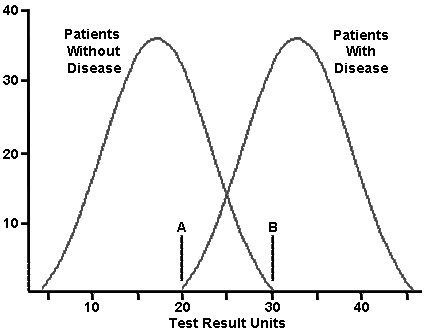Try to contain your excitement about another thrilling dive into the fascinating world of clinical pathology. If you want to skip ahead to the bomb-throwing, my conclusion will be that just about all the Republican legislators of Pennsylvania are scoundrels who should be removed from office as quickly as possible.
We've discussed previously the concept of establishing a cutoff for a diagnostic test, such as "what blood sugar level means you have diabetes" or "what defines 'kidney failure'". Click on that link and read the 2nd paragraph, the one under the graph image, for a refresher if needed.
So, with this concept of designing a diagnostic test in mind, we need to discuss the completely unacceptable revelation this week by Pennsylvania's chief voting officer, Carol Aichele, regarding the number of Pennsylvanians without the ID required to vote in the upcoming election, as a result of a GOP-passed bill. She states that there was no significant effort made to estimate how many people would be denied their vote as a result of the bill. To apply the diagnostic testing metaphor, the people who would be wrongly denied their voting rights would be the "false positives", who are incorrectly marked as fraudsters.
Aichele revealed that the state expected 100,000 people do not have ID. This conflicts with earlier testimony by other officials who reported that there are around 889,000 names on the voting rolls in Pennsylvania that don't match a name on PennDOT's list of who has ID, along with 574,630 with expired ID. That works out to something like 15% of people registered to vote without the most common forms of ID. It's true that other forms of ID would work, like military IDs or student IDs, so a pollster (who, fair warning, was hired by opponents of the law) conducted a survey which put the number at 12.7% of registered voters without any valid ID.
Now, especially given the qualification above, I would be perfectly willing to accept an argument which shows how the Republican proponents of the bill arrived at their estimate of the number of "false positives". If anyone were capable of mounting such an argument, one would think it would be the Republican in charge of voting in Pennsylvania, Ms. Aichele. But when confronted with the higher projections above, she simply responded "I disagree". She also admitted that an earlier Department of State estimate of 759,000 people without ID was calculated in less than a day by a single staffer who was told to come up with a number. She later admitted she didn't know how many people don't have ID.
Ms. Aichele specifically, and the Republican-dominated Pennsylvania government generally, are responsible for protecting Pennsylvanians' voting rights, but they show such callous disregard for those rights that they have no idea just how many hundreds of thousands of voters will lose their ballots. By Aichele's own admission, they were signing away voting rights for (by their numbers) 100,000 of their citizens, and they decided that was only worth one day of one staffer's time. This is unacceptable in a democracy.
The unavoidable conclusion to all of this is that the Pennsylvania Republican legislators just don't see 100,000-1,400,000 of their citizens losing their right to vote as a bad thing. I wonder how they would approach the issue if those hundreds of thousands were more likely to vote Republican.
Wednesday, August 1, 2012
Subscribe to:
Post Comments (Atom)

2 comments:
Which is why we need the Iraq method. Purple Ink, meet voting finger!
Voter ID is probably a good thing in general, to ensure people vote in only elections that they are eligible to vote in (local/county, etc) but the politicians should have worked to *get* everyone ID first, before requiring it.
Agreed NWest, for the most part. However, remember that disenfranchising first-time, minority, and poor voters is not an unintended side effect of what the Republican party is doing. It's the whole point.
Post a Comment